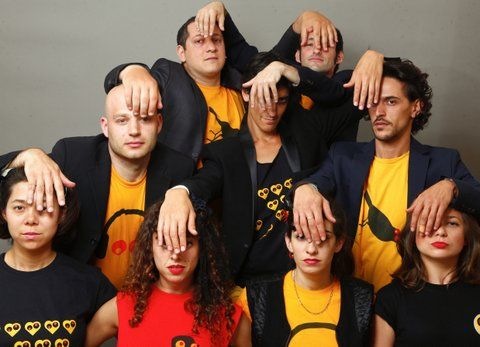Once upon a time, a group of young graduates from the Nissan Nativ Actors Studio had a vision. They would work together as an ensemble, crafting comedy from absurdist observations, mime, dance, and physical humour, for the delectation of audiences wheresoever they might find them in Israel. They workshopped, brainstormed, burnt the midnight oil and came up with a show. It was presented to audiences, and it was perceived to be good. So they did it again. And again. And then they decided to do something distinctly different. “Why don’t we put together a show in English?”

If only it were that easy. In some respects, the genesis of Israel comedy ensemble Tziporela’s new English-language show, Tziporela Worldwide, was anything but straightforward: working together since 2005, the Tel Aviv-based ensemble have produced three well regarded shows, Akitza Tivit, Derech Ha Gav and Heart Attack. In Hebrew. Stretching one’s repertoire to incorporate new influences, a change of direction is one thing. Embracing a new language is something else altogether, one might reasonably surmise.
“Well, we are a bit lucky, because four members (of 9) speak excellent English,” demurs group member Lotus Etrog when we spoke by telephone earlier this week, ahead of the third – and biggest – performance of their new show at the Arison Auditorium this weekend. “Omri (Doron) grew up in Tanzania, and Ben (Perry) lived in London. Dana (Ivgy) also speaks excellent English…”.
Tziporela Worldwide is a helter-skelter affair, classic sketch-based performance underpinned at times by some pretty subversive observational comedy. Adapted in part from two of the ensemble’s Hebrew shows and with new material added, there is an emphasis – but not a dominance – of physical humour. This helps with the language business, of course. But it’ll be wrong to presume that it offers an easy opt out for the performers.
“Our theatrical language is very physical,” Etrog affirms. “But with the new show, we tried to figure out what would speak to us as well as to someone from Paris, London, Rome…” Humour is a trick concept to negotiate across national and ethnic boundaries, regardless of language. A useful tool is to root it in universal concepts. “Most of the skits speak about the human condition, about love, hate, jealousy, anger,” Etrog says. “The emphasis is on this universal language rather than the physical or even the textual.”
Collectives sometimes embrace, but more often succumb, to the the untidiness inevitable with too many cooks sticking their oars in the broth. Tziporela Worldwide, whilst incorporating enough individuality as to lend it character, is impressively seam-free. When I ask Etrog about the creative process that begins with 9 individuals and ends with a stage show, her description is both revealing and intriguing.
“We do lots of workshops…it’s like being a student again,” she laughs. “We took a lot of workshops with guest teachers in mime, African dance, all kinds of things from the outside.” At some point the students have to start teaching themselves. “We also picked a subject each and presented it to the group as a workshop. And everyone else had to prepare homework in advance.” From these sessions evolved 50 or so ideas, which were eventually whittled down to the 2 dozen or so that made the final cut. “The process is explorative, organic,” she says.
Inspiration comes from other sources. When I ask about their influences, Etrog lists an eclectic range, from Monty Python and Louis CK to the Batsheva dance company and Cirque de Soleil. But the most interesting source is an unexpected one. “We run lots of sessions and workshops with high school students, and we get a lot of ideas and inspiration from them,” Etrog says. “They tell us about new bands, clothes…there are lots of things that 14-year-olds know that a 31-year-old doesn’t!” True.
Back to the show. Does working outside one’s comfort zone lend one the inclination to taking risks, being perhaps a little more daring? In one respect, the answer is no. The ensemble worked very hard with language coach Diana Oleartchik to fine-tune their stage presence. “The most important thing she told us was to be confident, to speak from the heart and not to concentrate on every word.”
Preparation is important, indeed essential ahead of the debut of Tziporela Worldwide, at a benefit function in Melbourne, Australia at the invitation of Keren HaYesod. “It was a big venue, around a 1000 people,” Etrog recalls. But their second show, four days later, was a spontaneous affair. Etrog had watched a show in a small venue with an appealing vibe. On a whim, she approached the owner to see if he would agree to put on their show. “He was really unsure at first…but then, we only gave him four days notice. But he agreed, we ran around and managed to pull it off. It was lots of fun…”
Final question. Back to the language and cultural issue: can their humour serve as a channel, a conduit for an outsider trying to get to grips with Israeli culture and society? Etrog pauses for a moment. “The circumstances…I mean, we are Israelis, Tel Avivians, Jews. This is where we stand, and as people we believe in respecting what we have and doing good for the community. We have the opportunity to allow people to reflect on a different face of Israel. Even if it is just for a moment, if we have the chance to show a different, truthful face, then why not?”
Tziporela are Efrat Aviv, Dana Ivgy, Lotus Etrog, David Golan, Omri Doron, Tomer Nahir, Ben Perry, Gal Friedman and Tamara Klayngon. Tziporala Worldwide will be presented on Saturday 9th March at the Arrison Auditorium in Tel Aviv.





